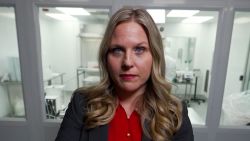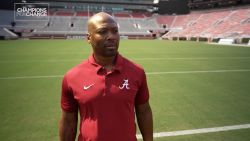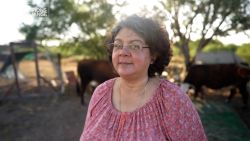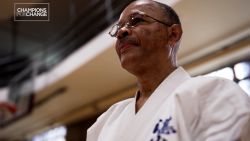Programming note: CNN Chief Medical Correspondent Dr. Sanjay Gupta introduces us to leaders and volunteers behind inspiring organizations in a one-hour, prime-time “Champions for Change” special airing Saturday, June 23, at 8pm ET on CNN.
“We have Raisin Bran and a green apple, a red apple, and graham crackers,” said Gia (I changed her name for the sake of privacy here). We were sitting face to face in an Atlanta classroom as the bright elementary school student showed me the snacks and other food she was excited to take home for the weekend. The bags of food arrived every week for the kids in her school, courtesy of the charity “Blessings In A Backpack”.
I was struck by how gingerly Gia handled each item. Clearly, the single-serving-sized fare was important to her.
It also struck me that for most of us, the bag didn’t contain much. It was stocked mostly with the kind of stuff you might get at the vending machine or fruit stand as a second thought.
But most striking to me? That for many of the kids this charity helps in 47 US states, this stash of food may be all they get to eat until the school bell rings Monday morning..
Let that sink in.
I was already familiar with the Louisville-based charity, and had appeared at galas to help raise funds for it. I had also profiled the volunteers for a news feature showing how they filled the bags each week, assembly-line style.
But now here I was, just a few miles from my own home in Atlanta, at a school where every child qualifies for free school lunches.
But what about the weekends? Gia hinted at why regular meals on Saturday and Sunday may be a challenge, and that her “Blessings” bag provides a little more security.
She said, “It makes me happy because my mama doesn’t have the money. And we can’t go…so I eat that.”
My family also knows the sting of poverty
I recognize I may have a soft heart for the cause because my dad grew up in a time of dire poverty in the hills of Eastern Kentucky.
HLN's Robin Meade opens up about her family ties to poverty
When you look at pictures from his childhood, you’d think it looked more like 1850 than the decade when America got television and the Soviet Union sent Sputnik into space.
In one shot, he’s a tiny barefoot toddler wearing baggy overhauls, and standing in a dusty yard where someone has hung a washbucket on the fence. The family had no running water then.
In another, he’s a teenager smiling in what could be a yearbook photo. It’s around the same period in life he says he became aware of how poor he was, and grew increasingly ashamed for things he had no control over, like having to wear the same shirt and pants for an entire week, every week, at school.
“You’d get pretty ripe by Friday,” he told me.
But I am SO GRATEFUL he says he never had to struggle with the gnawing pain of childhood hunger.
Dad says families, including his own, ate what they grew. He says as tenant farmers, my grandparents paid their rent for their huge brood (my dad was baby #14) with a portion of the crop they harvested on land they never owned.
As a result, there seemed to be a dependable supply of something to eat, he says.
But that is not the case for more school-aged kids in America than most of us realize.
It’s why my chat with Gia stays in my mind.
Here was a child who, through no fault of her own, needed a helping hand. And she was so grateful to get it, proclaiming:
“I want to start a new school and a charity. I would like to have a school that would be grateful too for what they have”.
Though she didn’t say it outright, I felt like she was letting us know, not only did “Blessings in a Backpack” help fill her belly, it was also going a long way in feeding her huge potential.
That thought still brings a lump to my throat.































